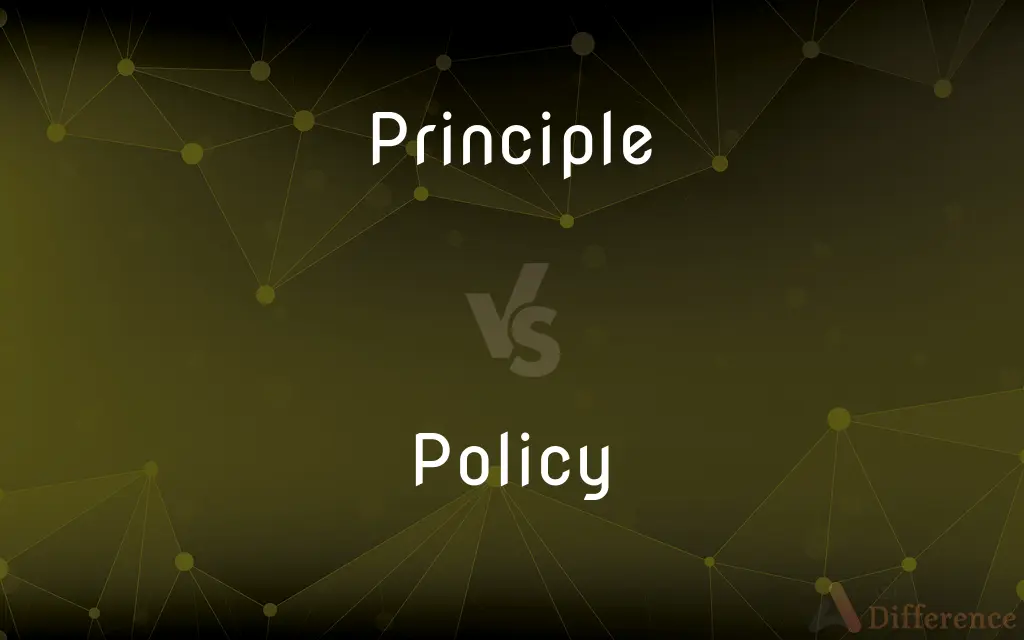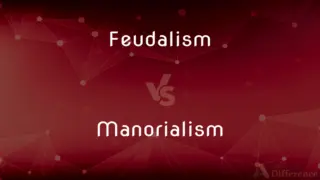Principle vs. Policy — What's the Difference?
By Urooj Arif & Fiza Rafique — Updated on March 27, 2024
Principle refers to a fundamental belief or rule guiding behavior, while policy is a set of guidelines or rules designed to achieve specific goals within an organization.

Difference Between Principle and Policy
Table of Contents
ADVERTISEMENT
Key Differences
Principle often denotes a foundational belief or standard that guides moral or ethical decisions, acting as a compass for personal or organizational behavior. These are generally universal, abstract, and aimed at ensuring integrity and ethical conduct. Policy, on the other hand, refers to specific guidelines or rules established by organizations, governments, or groups to achieve certain objectives and manage various situations. Policies are more concrete, situational, and are designed to guide actions and decisions in specific contexts.
Principles are more stable and enduring, often remaining unchanged over long periods. They serve as the foundation upon which policies and other rules are built, ensuring that actions and strategies align with core values and ethical standards. Policies are more dynamic and can change in response to new information, societal demands, or internal organizational shifts. They are practical applications of principles, tailored to specific situations, and are often subject to review and revision to remain effective and relevant.
While principles provide a broad framework for what is considered right or wrong, policies offer detailed pathways and procedures for implementing those values in practical scenarios. Principles might dictate a commitment to sustainability, whereas a policy would specify the steps an organization takes to reduce its environmental impact.
Comparison Chart
Nature
Fundamental belief or standard
Specific guidelines or rules
Purpose
Guide moral or ethical decisions
Achieve specific objectives within an organization
ADVERTISEMENT
Stability
More stable and enduring
Subject to change and adaptation
Scope
Universal and abstract
Situational and concrete
Application
Broad framework for behavior
Detailed procedures and rules
Compare with Definitions
Principle
A foundational belief that influences decisions and actions.
The principle of honesty compels us to tell the truth, even when it's difficult.
Policy
A rule set by an organization to guide actions.
The company's privacy policy outlines how customer information is protected.
Principle
A guideline for ethical behavior.
The principle of respect for others guides us in our interactions and communications.
Policy
A tool for managing organization operations.
HR policies ensure fair treatment of employees across the organization.
Principle
A philosophy that guides life or organizational decisions.
Environmental sustainability principles influence how a company manages its resources.
Policy
A directive aimed at achieving long-term goals.
Health policies in a city may focus on increasing access to nutritious foods.
Principle
A rule for personal or organizational conduct.
Adhering to the principle of fairness ensures that everyone is treated equally.
Policy
A law or regulation established by government.
Environmental policies regulate industries to protect natural resources.
Principle
An underlying truth that informs beliefs and actions.
The principle of cause and effect teaches us that every action has a consequence.
Policy
A detailed plan to achieve specific goals.
The school's bullying policy provides a clear process for addressing incidents.
Principle
A principle is a proposition or value that is a guide for behavior or evaluation. In law, it is a rule that has to be or usually is to be followed.
Policy
Policy is a deliberate system of principles to guide decisions and achieve rational outcomes. A policy is a statement of intent, and is implemented as a procedure or protocol.
Principle
A fundamental truth or proposition that serves as the foundation for a system of belief or behaviour or for a chain of reasoning
The basic principles of justice
Policy
A course or principle of action adopted or proposed by an organization or individual
It is not company policy to dispense with our older workers
The government's controversial economic policies
Principle
A general scientific theorem or law that has numerous special applications across a wide field.
Policy
A contract of insurance
They took out a joint policy
Principle
A fundamental source or basis of something
The first principle of all things was water
Policy
An illegal lottery or numbers game
He swore that he had never played policy in his life
Principle
A basic truth, law, or assumption
The principles of democracy.
Policy
A plan or course of action, as of a government, political party, or business, intended to influence and determine decisions, actions, and other matters
American foreign policy.
The company's personnel policy.
Principle
A rule or standard, especially of good behavior
A man of principle.
Policy
A course of action, guiding principle, or procedure considered expedient, prudent, or advantageous
Honesty is the best policy.
Principle
The collectivity of moral or ethical standards or judgments
A decision based on principle rather than expediency.
Policy
Prudence, shrewdness, or sagacity in practical matters
It is never good policy to speak rashly.
Principle
A fixed or predetermined policy or mode of action.
Policy
A written contract or certificate of insurance.
Principle
A basic or essential quality or element determining intrinsic nature or characteristic behavior
The principle of self-preservation.
Policy
A numbers game.
Principle
A rule or law concerning the functioning of natural phenomena or mechanical processes
The principle of jet propulsion.
Policy
A principle of behaviour, conduct etc. thought to be desirable or necessary, especially as formally expressed by a government or other authoritative body.
The Communist Party has a policy of returning power to the workers.
It's company policy that all mobile phones are forbidden in meetings.
Principle
(Chemistry) One of the elements that compose a substance, especially one that gives some special quality or effect.
Policy
Wise or advantageous conduct; prudence, formerly also with connotations of craftiness.
Principle
A basic source. See Usage Note at principal.
Policy
Specifically, political shrewdness or (formerly) cunning; statecraft.
Principle
A fundamental assumption or guiding belief.
We need some sort of principles to reason from.
Policy
The grounds of a large country house.
Principle
A rule used to choose among solutions to a problem.
The principle of least privilege holds that a process should only receive the permissions it needs.
Policy
(obsolete) The art of governance; political science.
Principle
Moral rule or aspect.
I don't doubt your principles.
You are clearly a person of principle.
It's the principle of the thing; I won't do business with someone I can't trust.
Policy
(obsolete) A state; a polity.
Principle
(physics) A rule or law of nature, or the basic idea on how the laws of nature are applied.
Bernoulli's Principle
The Pauli Exclusion Principle prevents two fermions from occupying the same state.
The principle of the internal combustion engine
Policy
(obsolete) A set political system; civil administration.
Principle
A fundamental essence, particularly one producing a given quality.
Many believe that life is the result of some vital principle.
Policy
(obsolete) A trick; a stratagem.
Principle
A source, or origin; that from which anything proceeds; fundamental substance or energy; primordial substance; ultimate element, or cause.
Policy
(obsolete) Motive; object; inducement.
Principle
An original faculty or endowment.
Policy
(law)
Principle
Misspelling of principal
Policy
A contract of insurance.
Principle
(obsolete) A beginning.
Policy
A document containing or certifying this contract.
Your insurance policy covers fire and theft only.
Principle
(transitive) To equip with principles; to establish, or fix, in certain principles; to impress with any tenet or rule of conduct.
Policy
(obsolete) An illegal daily lottery in late nineteenth and early twentieth century USA on numbers drawn from a lottery wheel (no plural)
Principle
Beginning; commencement.
Doubting sad end of principle unsound.
Policy
A number pool lottery
Principle
A source, or origin; that from which anything proceeds; fundamental substance or energy; primordial substance; ultimate element, or cause.
The soul of man is an active principle.
Policy
(transitive) To regulate by laws; to reduce to order.
Principle
An original faculty or endowment.
Nature in your principles hath set [benignity].
Those active principles whose direct and ultimate object is the communication either of enjoyment or suffering.
Policy
Civil polity.
Principle
A fundamental truth; a comprehensive law or doctrine, from which others are derived, or on which others are founded; a general truth; an elementary proposition; a maxim; an axiom; a postulate.
Therefore, leaving the principles of the doctrine of Christ, let us go on unto perfection.
A good principle, not rightly understood, may prove as hurtful as a bad.
Policy
The settled method by which the government and affairs of a nation are, or may be, administered; a system of public or official administration, as designed to promote the external or internal prosperity of a state.
Principle
A settled rule of action; a governing law of conduct; an opinion or belief which exercises a directing influence on the life and behavior; a rule (usually, a right rule) of conduct consistently directing one's actions; as, a person of no principle.
All kinds of dishonesty destroy our pretenses to an honest principle of mind.
Policy
The method by which any institution is administered; system of management; course.
Principle
Any original inherent constituent which characterizes a substance, or gives it its essential properties, and which can usually be separated by analysis; - applied especially to drugs, plant extracts, etc.
Cathartine is the bitter, purgative principle of senna.
Policy
Management or administration based on temporal or material interest, rather than on principles of equity or honor; hence, worldly wisdom; dexterity of management; cunning; stratagem.
Principle
To equip with principles; to establish, or fix, in certain principles; to impress with any tenet, or rule of conduct, good or ill.
Governors should be well principled.
Let an enthusiast be principled that he or his teacher is inspired.
Policy
Prudence or wisdom in the management of public and private affairs; wisdom; sagacity; wit.
The very policy of a hostess, finding his purse so far above his clothes, did detect him.
Principle
A basic generalization that is accepted as true and that can be used as a basis for reasoning or conduct;
Their principles of composition characterized all their works
Policy
Motive; object; inducement.
What policy have you to bestow a benefit where it is counted an injury?
Principle
A rule or standard especially of good behavior;
A man of principle
He will not violate his principles
Policy
A ticket or warrant for money in the public funds.
Principle
A basic truth or law or assumption;
The principles of democracy
Policy
The writing or instrument in which a contract of insurance is embodied; an instrument in writing containing the terms and conditions on which one party engages to indemnify another against loss arising from certain hazards, perils, or risks to which his person or property may be exposed. See Insurance.
Principle
A rule or law concerning a natural phenomenon or the function of a complex system;
The principle of the conservation of mass
The principle of jet propulsion
The right-hand rule for inductive fields
Policy
A method of gambling by betting as to what numbers will be drawn in a lottery; as, to play policy.
Principle
Rule of personal conduct
Policy
To regulate by laws; to reduce to order.
Principle
(law) an explanation of the fundamental reasons (especially an explanation of the working of some device in terms of laws of nature);
The rationale for capital punishment
The principles of internal-combustion engines
Policy
A line of argument rationalizing the course of action of a government;
They debated the policy or impolicy of the proposed legislation
Policy
A plan of action adopted by an individual or social group;
It was a policy of retribution
A politician keeps changing his policies
Policy
Written contract or certificate of insurance;
You should have read the small print on your policy
Common Curiosities
What is a policy?
A policy is a set of guidelines or rules designed to achieve specific objectives within an organization or society.
Can policies change over time?
Yes, policies are subject to change and adaptation to remain effective and relevant to new information or societal demands.
Are principles universal?
Principles are generally considered universal and abstract, providing a broad framework for ethical conduct.
How do principles and policies differ?
Principles are fundamental beliefs guiding ethical behavior, whereas policies are specific rules or guidelines designed to achieve organizational goals.
Why are policies important in an organization?
Policies provide a structured pathway for achieving specific goals and managing situations within an organization.
How do principles influence policies?
Principles serve as the ethical foundation upon which policies are built, ensuring actions align with core values.
Can an individual have personal principles?
Yes, individuals can have personal principles that guide their behavior and decisions.
What is a principle?
A principle is a foundational belief or standard that influences decisions and actions, guiding moral or ethical behavior.
What role do policies play in government?
In government, policies serve as regulations and laws to manage society and achieve public objectives.
Can policies vary between organizations?
Yes, policies can vary significantly between organizations based on their specific goals, culture, and industry standards.
Is it possible for a policy to contradict a principle?
While it's not ideal, conflicts can arise between policies and principles, often leading to ethical dilemmas that require careful resolution.
How are policies developed?
Policies are developed through a process that includes research, analysis, and consultation with stakeholders to address specific needs or issues.
How can organizations ensure their policies reflect their principles?
Organizations can ensure alignment by regularly reviewing policies to make sure they are in harmony with their foundational principles.
How do principles affect societal behavior?
Principles influence societal behavior by setting standards for what is considered morally right or wrong, guiding individual and collective actions.
What makes a good principle?
A good principle is universal, enduring, and provides clear guidance for ethical behavior and decision-making.
Share Your Discovery

Previous Comparison
Platinum vs. Palladium
Next Comparison
Feudalism vs. ManorialismAuthor Spotlight
Written by
Urooj ArifUrooj is a skilled content writer at Ask Difference, known for her exceptional ability to simplify complex topics into engaging and informative content. With a passion for research and a flair for clear, concise writing, she consistently delivers articles that resonate with our diverse audience.
Co-written by
Fiza RafiqueFiza Rafique is a skilled content writer at AskDifference.com, where she meticulously refines and enhances written pieces. Drawing from her vast editorial expertise, Fiza ensures clarity, accuracy, and precision in every article. Passionate about language, she continually seeks to elevate the quality of content for readers worldwide.













































